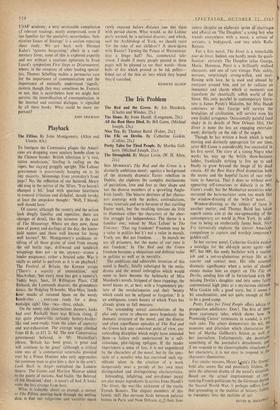Playback
The. Fifties. By John Montgomery. (Allen and Unwin, 45s.) To fumigate the Communist plague the Ameri- cans are dropping some sanitary bombs,close to the Chinese border. British television is 'a vast, rotten mushroom.' Sterling is reeling on the ropes, but staying groggily upright. The Labour government is precariously hanging on to its tiny majority. Skimmings from yesterday's front page? No, the reflection of our battered, bleary
old mug in the mirror of the 'fifties. 'You haven't changed a bit,' loud with spurious heartiness to conceal irritation and disbelief, should invoke at least the unspoken thought: 'Well, r bloody- well should have.'
Of course, although the scenery and the action look dingily familiar and repetitive, there are changes of detail, like the turnover in the cast of The Mousetrap, Where are they now, those men of power and darlings of the day, the house- hold names and those well known for being well known? Mr. Montgomery's assiduous re- sifting of all those grains of sand from among the old bottle tops, driftwood and sandwich wrappings does not—in me, anyway—arouse a lender poignancy, rather a ,bruised ache. Was it really as awful to perform as it is on playback? The Festival of Britain, the Korean scrape (There's a scarcity of ammunition,' said MacArthur, 'but every man has got a camera'), Teddy boys, Suez, 10 Rillington Place, Cliff Richard, the Lynmouth disaster, the groundnUts fiasco, the fledgling H-bombs, Mau-Mau, lunch- tour snacks of rationed Spam on the weedy tomb-sites . . everyone ready for a deep, nostalgic sigh? One--two—three, exhale.
On the sunny side (intermittent showers, looks bad over Rockall) there was Britain rising, if not quite phoenix-like certainly battery-broiler- like and oven-ready, from the ashes of austerity and war-exhaustion. The average wage, climbed from £6 8s. to fl 1 2s. 6d. The new Conservative government believed, in Mr. Macmillan's phrase, 'Britain has been great, is great and will continue to be great' (although a critical view was of 'a commercial saturnalia presided over by a Prime Minister who only approaches the common man to give him a shot in the arm'). Look Back in Anger revitalised the London theatre. The Goons and Marilyn Monroe added to the gaiety of nations. And Stalin, 'the Beloved of All Mankind,' died: it wasn't all bad. It looks none the less strange from here.
What is valuable about• so prompt a survey as The Fifties, peering back through the settling dust, is that our vulgarities and vacuities stand
rawly exposed before distance can tint them with period charm. What would, 'as the Labour party warned, be 'a national disaster,' and which, said the Archbishop of York, we should resist 'for the sake of our children'? A show-dpwn with Russia? Turning the Palace of Westminster into a bingo hall? No, commercial tele- vision. I doubt if many people quoted in these pages will be pleased to see their words—those balls of fire which proved to be ink pellets— fished out of the thin air into which they hoped they'd vanished.
KENNETH ALLSOP






























 Previous page
Previous page